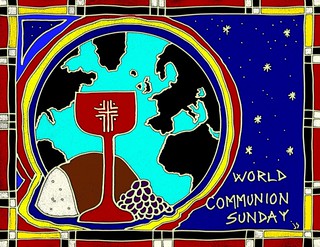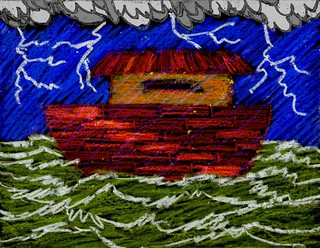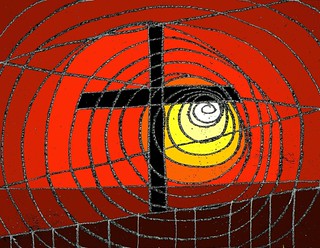Matthew 15:36 Then Jesus took the
seven loaves and the fish, and when he had given thanks, he broke them and gave them to the disciples, and they in turn
to the people. (NIV)
One of the first pictures that I
ever saw of Jesus was contained in a children’s book. In my mind’s eye I can
still see it. Jesus is standing at the top of a hill with his hands held up in
prayer to God. Before Him, on a rock, loaves and fishes have been placed. His
disciples are gathered beside Him and a great crowd of people are around them,
all over the hillside. It was a beautiful picture of the miraculous feeding of
thousands of people and it has stayed in my heart ever since.
As an adult, the nearest that I ever
get to experiencing this bounteous beauty happens each month during the
Communion service at the church I serve. About a hundred and fifty people are offered
a little square of bread and a small cup of wine; they are spiritually fed and
soulfully satisfied. They are at peace with God and filled with Christ’s love.
It’s a wonderful church moment of grace and hope. Needless to say, I look
forward to this experience each month.
This Sunday, the whole world will be
celebrating Communion across the entire globe. People from other lands will
share in this amazing and wonderful feast. To me, World Communion Sunday is
almost as important as Christmas Day, Easter, and Pentecost. It’s the one day
in the year when Christians everywhere share in the blessings of Christ’s sacrificial
love. It’s about as close to ‘peace on Earth’ as we will ever experience on
this side of glory.
So wherever you are this Sunday, let
me urge and encourage you to join in this celebratory feast of Christ. Isn't it
amazing that little squares of bread and small cups of wine will unite millions
of Christians across the world? Isn't it wonderful that Christ’s miraculous
feeding of His people is still experienced today?
Questions for personal reflection
What
does Communion mean to me? How will my spirit connect to other Christians
across the globe on World Communion Sunday?
Prayer: Lord Jesus, we thank You for the gift
of Communion which has become a holy and precious experience in our lives.
Thank You for the promises that are fulfilled through the giving of Your sacred
body and blood on Calvary, as well as the receiving and partaking of the holy bread
and wine that we are offered at Communion. Bless us and all Your people on Earth,
especially during World Communion Sunday. In Your Holy Name, we thankfully
pray. Amen.
John
Stuart is the pastor of Erin Presbyterian Church in Knoxville, Tennessee. If
you would like to ask questions or make a comment about today’s message, please
send him an email to Traqair@aol.com.
Today’s
image is John’s latest drawing for World Communion Sunday. If you would like to
view a larger version, please click on the following link: Communion.




